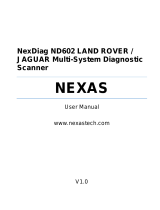
4
continuous monitors are constantly evaluating, they will be reported as Ready
all of the time. If testing of a particular supported non-continuous monitor has
not been completed, the monitor status will be reported as Not Complete or Not
Ready.
In order for the OBD monitor system to become ready, the vehicle should be
driven under a variety of normal operating conditions. These conditions may
include a mix of highway driving and stop and go, city type driving, and at least
one overnight-off period. For specific information on getting your vehicle OBD
monitor system ready, please consult your vehicle user manual.
2.5 OBD II Modes of Operation
Here is a basic introduction to the OBD II communication protocol.Mode byte:
The first byte in the stream is the mode number. There are 10 modes for
diagnostic requests. The first byte in the response data bytes is this same
number plus 64. For example, a mode 1 request would have the first data byte
= 1, and the response would have the first data byte = 65. Here is a brief
description of the modes:
Mode $01
–
Identifies the Powertrain information and shows current data
available to the scan tool.
This data includes: DTC set, status of on-board
tests, and vehicle data such as engine RPM, temperatures, ignition advance,
speed, air flow rates, and closed loop status for fuel system.
Mode $02
–
Displays Freeze Frame data.
Same data as in mode 1,but it was
captured and stored when a malfunction occurred and a DTC was set. Some of
the PIDs for mode one are not implemented in this mode.
Mode $03
–
Displays the type of powertrain or emission related DTCs
stored by a 5 digit code identifying the faults.
There may be more than one
response message if there are more trouble codes than will fit in the data bytes
of the response message, or if there are more than one ECU computer
responding.
Mode $04
–
Used to clear DTCs and Freeze Frame data.
This clears all
diagnostic trouble codes that may be set including freeze frame data and
readiness monitors.
Mode $05
–
Displays oxygen sensor test results.
This mode displays the
oxygen sensor monitor screen and the test results gathered about the oxygen
























